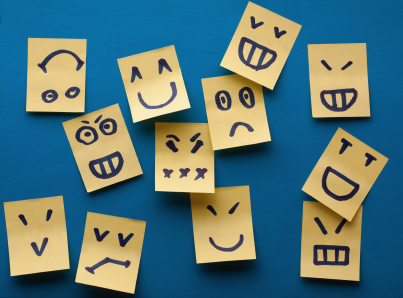(Im)perfect happiness
To start out, I’d like to set something straight.
When I refer to happiness, I am usually talking about an overall sense of well-being. Not necessarily just a sense of elation and joy that makes you want to do cartwheels every day. Yes, positive emotions are part of the overall picture for happiness, but they are just one part of the equation.
The idea of happiness does not mean you have to feel on top of the world all the time. And it does not mean we can only have positive thoughts and feelings 100% of the time.
Here’s the deal: We are human! Aiming to feel joyful 100% of the time is not realistic. It is also unhealthy to not allow yourself to feel what you are feeling, such as in times of grief, for example. If you push feelings down and ignore them without acknowledging them or dealing with them, they will show up later on, ether by manifesting again emotionally or even physically. (Holding it all in can make us sick.)
As humans, we are supposed to experience a range of emotions. We are supposed to FEEL. We are supposed to BE.
Here’s the rule of thumb that I like: Psychologist Barbara Fredrickson suggests a 3:1 ratio. The underlying theory is that for every negative thought, there will ideally be three positive thoughts or emotions.
That’s it! This usually puts a lot of my clients at ease. We’re not aiming for 100%, my friends. And I certainly don’t advocate for that. It’s okay to be sad or angry at times. Even the Dalai Lama admits to feeling angry occasionally.
Note: Of course it is a different story to be angry for years or sad on a continuing basis to the point that it is paralyzing. I’m talking more about the short-term emotions that we all feel. (And I’m also not saying it’s okay to deal with these emotions with harmful behaviors.)
So with 3:1, you don't actually have to count each thought or emotion. Unless you want to track and record to get an idea of your patterns and triggers, the 3:1 is primarily a concept to aim for and to keep in mind. We don’t have to get carried away and obsess over trying to be happy. (That’s SO not he point :)).
There’s no need to aim for perfection. Be the best you as you know how - tears, emotions and all. Of course, we absolutely have to take responsibility for our own happiness and make a conscious effort. And yes, there are always positive aspects and so much to be grateful for no matter what. It’s just that when we want to be perfect (in this case, with our thoughts and feelings), then we can start to feel guilty for thinking or feeling anything but joy, which in itself can cause a different cycle of negative emotions. The ego steps in. Beating ourselves up for not feeling awesome occasionally or because we don't feel how we think we SHOULD feel does not serve us and can have a ripple effect. Just remember to tip the scales on the side of well-being in the bigger picture.
So relax into this idea. Just BE and know that all is well.
What are your next steps? Be sure to share your insights below as your input can help others as well!

